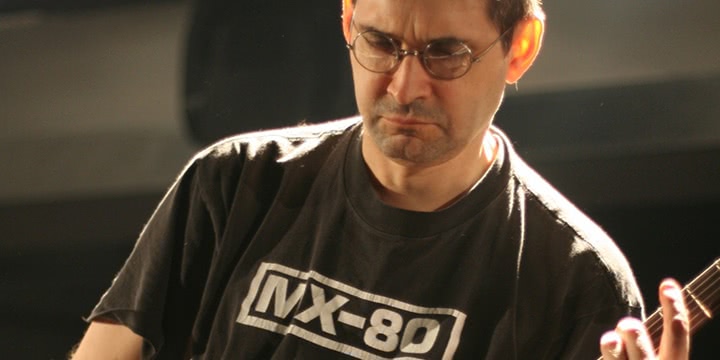When punk rock musician and studio engineer Steve Albini hears predictions of the apocalyptic economic impact of the internet on musicians’ livelihoods, he recognises echoes of dire prophecies of yore.
When sheet music was first made available, court musicians predicted the end of their livelihood. When the phonograph was invented, concert hall and opera performers saw the end of their careers. When broadcast radio appeared in the home, it too signalled the end of days for musicians. And when recordable cassettes turned up (followed by recordable CDs), well, that really was the death knell.
“There have been other paradigm shifts in the music industry, and at every juncture when things have changed, the established music industry as it sat at the moment reacted with horror, and not with a resignation that they had to adjust their expectations,” Albini says. “They made it seem as if it was morally wrong that things had to change.”
But what actually happened, the Chicago maestro argues, is that these seismic changes resulted in an increased awareness and appreciation of music. And notwithstanding the dire predictions of musicians and industry executives, the internet is actually a good thing for musicians. “As more and more musicians realise that they can operate without the participation of a music label, then those labels will be operating with a thinner and thinner back catalogue, and the arc of the technology will bypass them completely,” Albini says.
In fact, Albini is so enamoured with technological developments that he believes they’ve gone a long way to addressing the issues he outlined in his 1993 Baffler essay, ‘The Problem With Music’. Back then, Albini contended, the music industry was so laden with ancillary actors – managers, labels, publishing companies, public relations agents – that any revenue generated by artist sales would inevitably be eroded well before a trace of income reached the creating artist.
But the internet changes all of that – in Albini’s mind, at least – for the better. More avenues of distribution means greater awareness and increased niche markets, which is good for artists. And most importantly, the ability of an artist to market direct to their audience means that musicians are no longer captive to the industry model and its nasty hidden costs.
“The efficiency of that [new] model means that people will be operating on a sustainable basis, on a smaller scale, which allows for much wider variety, which allows for more specialisation, which allows for musicians and audiences to interact in a way that’s uniquely suited to a certain kind of music or a certain frame of mind,” Albini says.
Albini, whose storied studio career has seen him work with the likes of Nirvana, Pixies, PJ Harvey, Manic Street Preachers and countless others, also says it’s time to look critically at the issue of intellectual property, and in particular copyright. Originally a licence granted by the Crown to permit people the right to print books, copyright has morphed into an economic interest. With the prevalence of piracy and streaming services (which, Albini agrees, pay a bare pittance to the artists featured), the value of that economic interest has been substantially eroded.
While Albini recognises the importance of copyright, he believes the whole concept – especially the notion of ‘control’ of an artistic work – needs to be re-thought in an online world. “What someone who originates a piece of work has is the first bite of the apple. They can popularise it, monetise it first – sort of like the inventor of a mousetrap. If you have something first, you can exploit it first before anyone else,” he says.
But with a plethora of distribution scenarios now in existence, the notion of ‘control’ of a musical product is an anachronistic assumption. “I feel like any music that’s released now has to be done with open eyes – that is, you have to realise that that’s how the world treats music now. It’s shared amongst enthusiasts, you don’t have exclusive control over music once you’ve released it. I’m comfortable with that, but some people are not comfortable with that and they want to change the world so they can retain some semblance of control over the music once it’s released. I think that’s not realistic.”
Unsurprisingly, not everyone agrees with Albini’s provocative assessment. When in 2014 Albini dipped his toe into the waters of public discourse and asserted that the internet is not a threat but an opportunity, the reaction was swift and harsh. However, ahead of his Australian tour with his band Shellac this month, Albini says he’s not just voicing his own opinions, but those of his contemporaries.
“Perhaps I’m flattering myself when I say I’m being rational, but all of these opinions have been gleaned by me through consideration and experience and also through my interactions with other musicians – I’ve taken on the positions held and expounded by other musicians,” Albini says. “So I take them at their word when they say their income goes up the more people share their music.”
Ever the pragmatist, Albini prefers a debate that’s rooted in rational argument, not the emotive pleas and hyperbolic assertions that often characterise the vexed issue of online file sharing and streaming services. “I don’t think there’s anything necessarily religious or sacrosanct or insulting about taking a position, especially on an economic issue,” Albini says. “When it’s purely a matter of money and why someone ought to be paid, or ought not to be paid, or feeling bad that someone’s not being paid – I feel these capitalistic positions are very easy to discuss rationally and I don’t think you gain anything by appealing to emotions when you’re not talking about someone’s personal attributes. What you’re talking about is a procedural thing or a practical matter of execution of business.”
[Steve Albini photo by Freekorps]
Shellac play the Metro Theatre on Tuesday December 8.

































